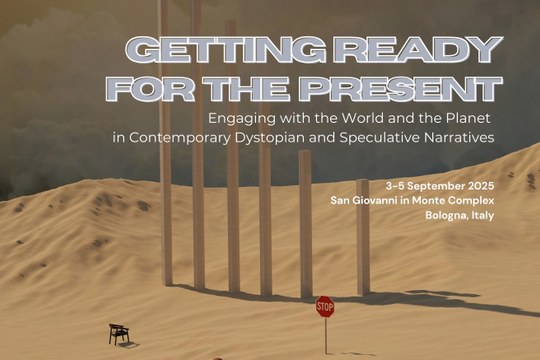
Paola Scrolavezza (P.I. PRIN 2022 Project: “Getting ready for the present: new global dystopian imaginaries and public engagement. Transcultural and transmedial dialogues between Japanese, Latin American, British and Angloamerican cultures”)
Elena Lamberti (Vice Director of the Department of Modern Languages, Literature and Cultures at the University of Bologna)
Claire Mercier, “Metamorphosis and Symbiosis in the Latin American Prospective Narrative of the Last Decade”, Chair: Edoardo Balletta
Alternative Epistemologies
Chair: Valeria Stabile
1. Alan N. Shapiro: A New Alternative to Capitalism
2. Luca Salvi: Predetermination and Ineffectiveness. Notes on the Paralysis of Agency
3. Federica Moscatelli: Rethinking Eco-Catastrophe: Local and Global Perspectives from Latin America
4. Alessandra Vannucci: Observing Some Amerindian Propositions About the End of the World
Collective Resistance and Apocalypses
Chair: Gino Scatasta
1. Beatrice Masi: Apocalypses We Live Through: A Reading of Paul Lynch’s Grace (2020)
2. Miłosz Wojtyna: The Rhetoric of Resilience and Resistance in Contemporary Dystopian TV Series
3. Kanya Viljoen: When ‘I’ Becomes ‘We’: Collective Resistance as Collective Reimagination [ONLINE]
4. Alessia Polatti: From Utopia to Dystopia: The ‘Island’ as a Space of Sociopolitical Estrangement and Liquid Modernity in the Recent Immigration Novel
Time, Memory and Trauma
Chair: Veronica De Pieri
1. Giulia Baselica: From the ‘Noon Universe’ to James Cameron’s Avatar: The Story of a Revelatory Dystopia
2. Maja Vodopivec: How Do the Past, Present, and Future Interact in Post-3.11 Japan? Examining Urban Utopia in the SF Manga Coppelion
3. Maria Varsam: Liminal Existence and the Fantastic in Yōko Ogawa’s Existential Dystopia, The Memory Police
4. Marilena Parlati: Suspended Apocalypse, Traumas of Anticipation, and a Lost Paradise: On the Beach by Nevil Shute (1957)
New Environmental Perspectives
Chair: Federica Moscatelli
1. Natalija Pop Zarieva and Krste Iliev: Transnational Deep Ecologies: Comparative Eco-Consciousness in Le Guin’s Always Coming Home and Crvenkovska’s The House Above the Waves
2. Klara Machata: Glimpses of Solidarity: Dystopian Urban Environments in South Asian Speculative Short Fiction and Beyond
3. Santiago Alarcón-Tobón: Post-Apocalyptic Submerged Territories: An Ecocritical Reading of El tiempo de en medio (2021) by Enrique Lozano
4. Nafisa Oliveira: From Greenwashing to Machinewashing: Pseudo-Ethics in Sustainability and Artificial Intelligence as Depicted in Dystopian Fiction
Ali Millar, Chair: Rita Monticelli
Reproductive Politics and Utopian/Dystopian Imaginaries in Feminist Speculative Fiction
Chair: Francesco Cattani
1. Raffaella Baccolini: Feminist Science Fiction of the 1970s and 1980s: Shaping Contemporary Reproductive Politics
2. Arianna Preite: Reproductive Justice as Freedom to Not Procreate
3. Chiara Xausa: Reproductive Justice as Climate Justice
Perspectives from Latin America
Chair: Valeria Stabile
1. Alis May Iseppi: Memory, Trauma and Resilience: Dystopian Narratives in Andean Oral Tradition
2. Sofia Ciavarella: Forward to the Past: Gauchoides and Gaucho-Zombis in Argentinian Speculative Fiction
3. Brînduşa Nicolaescu: Cyborg Voices as Hybrid Fictional Palimpsests: Narratives of (Dis)Remembering in Cielos de la tierra by Carmen Boullosa, Mantra by Rodrigo Fresán and Speak by Louisa Hall
Anthropogenic Turn in Japanese Literature
Chair: Anna Specchio
1. Laura Clark: A Cozy Café in an Ecological Disaster: Anticipating Isolation in Yokohama Kaidashi Kikou (1994-2006)
2. María Salvador: Medieval Futures: Augmented Pilgrimage and Virtual Ecologies in Kasuga Mandara
3. Jordi Serrano-Muñoz: Japan Sunk Again: The Anthropogenic Turn in Nihon Chinbotsu: Kibō no Hito
Posthuman Speculative fiction
Chair: Federica Moscatelli
1. Sayantina Dutta: Beyond Human and Machine: The Intersection of Gender, Nature, and AI in Klara and the Sun
2. Bratati Barik: Multiplicity of Apocalypse: A Perspective on Posthuman Studies [ONLINE]
3. Tuğba Aygan: All Animals Are Equal but Human Animals Are ‘More Equal’ in the Anthropo-Scene: Precarious Lives in Stef Smith’s Human Animals
Ayase Maru, Chair: Paola Scrolavezza, Nakayama Mayuko; translation by: Haruka Arakawa
Transpecies and Ecological Alliances
Chair: Francesco Cattani
1. Imad Adjabi: Beyond the Self: Weird Essentialism and Ecological Entanglement in Speculative Narratives
2. Aparajita Nanda: From Symbiosis to Symbiogenesis: Trans-Species Alliances in Octavia Butler’s Lilith’s Brood
3. Ángela Rivera-Izquierdo: Entangled Becomings: Weirdness and the Reconfiguration of Masculinities in Contemporary Fiction in English
Feminist and Corporeal Representations in Dystopia
Chair: Juan Scassa
1. Asuka Ozumi: Girls in Dystopia: Suzuki Izumi and Torikai Akane
2. Daniela Raspollini: Tear Apart Our Future: The Commodification of Human Bodies in Contemporary Speculative Literature
3. Evangeline Petra Scarpulla: Ecofeminist Imaginings in Novels by Yoko Tawada and Luiza Sauma: Climate Crisis, Migration, and Resistance on Earth and Beyond
4. Natalie Israyy: Parasite as a Technique: Beyond the Metaphoric and Representative Literature [ONLINE]
Mirko Lino, “Anarchy in the UK. Post-Apocalypse and Eco-Horror in Contemporary British Cinema”, Chair: Gino Scatasta
Harada Kazue, "Feminist Failed (Re)productive Futures in Japanese Speculative Fiction", Chair: Anna Specchio
Shape, Design and Architecture in Dystopian Narrative
Chair: Luca Paolo Bruno
1. Madelena Mañetto Quick: Speculative Design for More-Than-Human Worlds
2. María del Pilar Melgarejo: Shapeshifting in Frida Kahlo’s Art
3. Tomasz Dymowski: Qudan Rie’s Dystopian Narrative and Architecture of the Present in Tokyo Sympathy Tower (Tōkyō-to dōjōtō)
AI & Distopian imageries
Chair: Veronica De Pieri
1. Aba-Carina Parlog: The Unhinged Reality: ‘Lifted’ Children, Artificial Friends, and Digital Surrogates – [ONLINE]
2. Despoina Tantsiopoulou: Educated Clones: Dystopic Education as Trauma in Kazuo Ishiguro’s Never Let Me Go
3. Maria-Ana Tupan: Suppressing the Past, Undoing the Self
Paola Scrolavezza, Luca Paolo Bruno, Juan Scassa, Ludovica Pannitto e Valeria Stabile